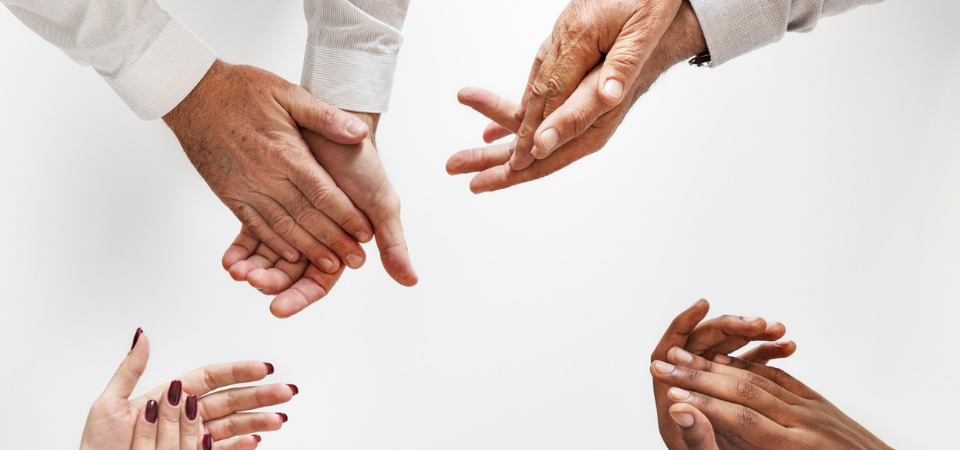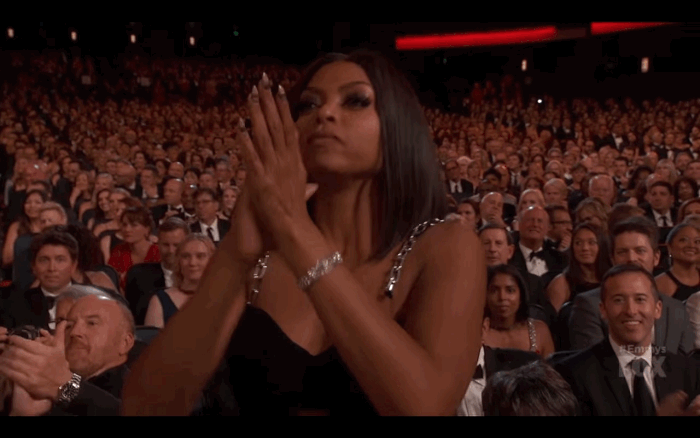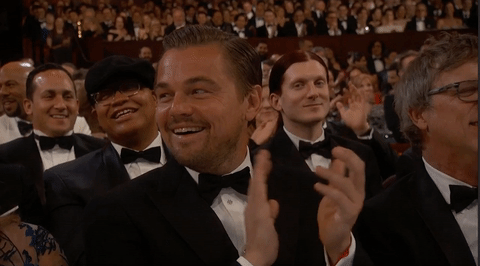What Is It Called When A Show Has A Lot Of Clapping And Laughing In The Background
- Apr 19, 2018
- Theatre in Paris exclusives
- Amanda Mehtala
THE HISTORY OF APPLAUSE
Some have said that clapping is similar high-fiving yourself in a positive response to something that someone else has done. Clapping is the most common sound that we, equally humans, use without our voice chords. We practise it as a social gesture to prove approving and admiration in groups, crowds, or by ourselves, and more and so in the setting of being presented with something similar a show or functioning. But what is the reason backside why we clap? Did you know that the boilerplate speed of our claps ranges from 2.five-5 claps per second? The meaning of clapping is recognized through every civilisation in the earth, and is one of the near universal means of communication. Permit's take a look at the history of adulation.
The activity of clapping is actually a quite primitive i, initially being used in response to existence aroused. In Western etiquette, a study has shown that the clap of an individual actually has very little to practise with that private's personal opinion of the quality of the performance. It has more to practise with the feeling of belonging in the group that someone has just experienced something with. Haven't you lot ever heard someone say that they're "just clapping to be polite"? Or when you applaud because everyone else is clapping, fifty-fifty if you're not really sure what'south going on yourself? Don't worry, we won't tell anyone!
In comparison to vocalizing approval through spoken communication, clapping is easier, louder, and more than bearding especially in crowds. You tin't tell much about a person through their clap, like whether they're male person or female person, or where they're from. Clapping is fifty-fifty considered more democratic, since stomping your feet can be too disruptive, and non everyone can snap their fingers. Taking it way dorsum to 6th century BC, lawmaker Kleisthénes of Athens made it so that audiences would have to clap in blessing of their leader, since in that location were likewise many people to meet individually. Through this came the "applause", the unified voices of all these people in the form of clapping together in adoration. A few hundred years afterward, in the 4th century BC came the claquer. A claquer was a person who was hired by theaters and shows to clap, weep, or laugh at the right moments in order to influence the audition's reactions. In the 4th century Athens, competition was fierce between comedians, and claquers became a mutual way to sway the determination of the judges and be awarded best performance. In the Roman Empire, the practice of using adulation to influence was practical to politics, and claquers were found in both courts of police and individual art demonstrations. Roman emperor Nero even established a school of applause with a claque of thousands of knights and soldiers following his concert tours!

Clapping history has a unique role in France and French venues equally well. In 18th century France, the claque had a strong presence every bit an organised trunk of professional applauders and influencers. Continually used in theatres to influence audiences, with the claquers often paid by the production and actors of a play in free tickets. The whole thing was quite organized, with sure claquers assigned to laugh loudly during comedic portions, others to shed a tear for a melancholic performance, and even claquers designated to comment their appreciation of a play or speech communication to fellow audience-members!
Nowadays, however, the days of claquers is over and all yous'll observe in Parisian playhouses is bonafide adulation. Nosotros do however find some traces, the remnants of the claquers are now limited to television prove sets and radio programs, in the form of adulation symbols to tell the audience when they should exist clapping, or fifty-fifty canned clapping and laughter.


It is interesting to notation besides that there are appropriate times and places for every adulation. It is considered perfectly normal to applaud a politician as he takes the phase before he even gives a voice communication, equally a sign of approving and in recognition of past accomplishments. In a religious setting, all the same, applauding is very rarely heard. While during a play information technology would exist deemed rude to brainstorm applauding in the eye of the functioning, one often hears clapping throughout an opera in appreciation for a particularly difficult piece of music. Applause tin can even evolve into college gestures of approval, continuing ovation anyone?
So, information technology can exist said that clapping has now evolved into an expectation and standard of beliefs. It's no longer a biological or sociological reaction, like it once was in primitive times, nor is it any longer used past private performance directors and political figures every bit a ways to influence. The act of applause and clapping forth with other people following a performance of any kind, has become a social norm with a long list of historical influences. Interesting how what was once used as a political coy is now the widespread ways of demonstrating appreciation!
Are you ready to applaud alongside the Parisians? Check out the Theatre in Paris programme of all the shows accessible to English-speakers in the City of Lights
We would honey your input!
If you've been to Paris before, are planning a trip, alive in Paris, or dream of visiting i mean solar day nosotros would beloved to hear about your experiences and expectations in the famous city through taking our survey!
On top of that, we would love to see what kind of knowledge yous accept about the theatre and events industry. If yous would be willing to accept the fourth dimension to help usa acquire more, click the push button beneath!
What Is It Called When A Show Has A Lot Of Clapping And Laughing In The Background,
Source: https://www.theatreinparis.com/blog/why-are-we-clapping-a-history-of-applause
Posted by: sullivanrefereall.blogspot.com


0 Response to "What Is It Called When A Show Has A Lot Of Clapping And Laughing In The Background"
Post a Comment